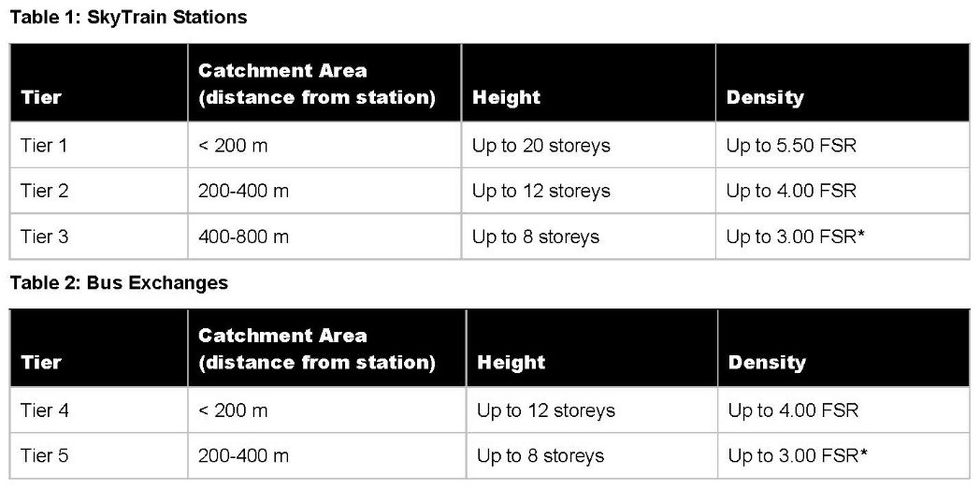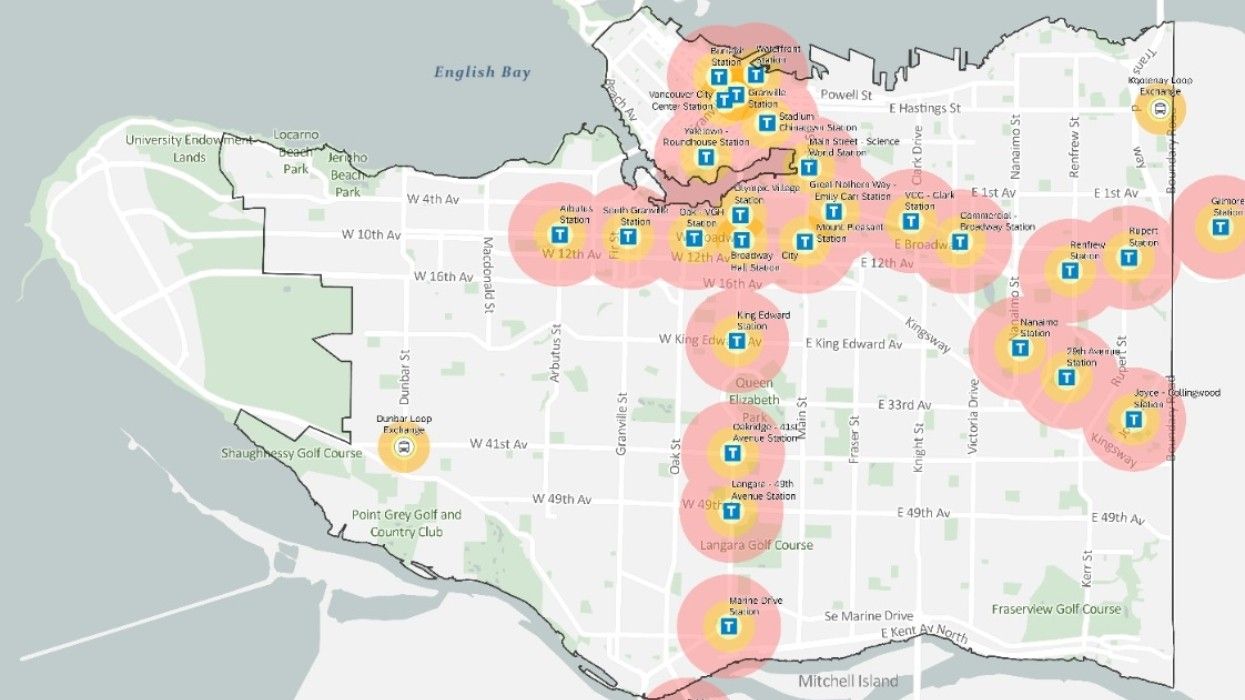Editor's Note: On June 26, Vancouver City Council approved the TOA Rezoning Policy, with one change, as detailed below.
Staff for the City of Vancouver have proposed a new Transit-Oriented Area (TOA) Rezoning Policy that would "guide reviews of rezoning enquiries" and "clarify City expectations within and outside of existing plan areas," according to a council report published this week.
The new TOA Rezoning Policy, focused on the city's 29 TOAs, would be in place until existing area plans are amended or new area plans are introduced to formalize the changes. It is set to be considered by Council on Wednesday, when Council will also formally designate the 29 TOAs in a new bylaw, just ahead of the June 30 deadline set by the Province.
When Bill 47 — known as the Housing Statutes (Transit-Oriented Areas) Amendment Act — was introduced by the Province last fall, all it did was identify transit-oriented areas across the Lower Mainland and set minimum height and minimum density requirements in those areas.
As the City notes in its council report, "The TOA regulations and TOA Policy Manual do not currently provide sufficient guidance to inform a detailed review of rezoning applications within TOAs," hence the need for the proposed TOA Rezoning Policy.
TOA Rezoning Policy: Land Use
Regarding land use, the proposed policy largely sticks to the Province's requirements, with the only significant change being the minimum density allowed for sites that are 200 metres or less (Tier 1) from a SkyTrain station. For such areas, the Province set a minimum density of 5.00 FSR, but the City is proposing to go to 5.50 FSR.
Staff say this change would "better reflect the expected form of development based on typical lot sizes and assemblies in the Vancouver context" and "enables additional redevelopment options."
Staff are also proposing this change be extended to "certain RM-zoned properties in the Commercial-Broadway Station Precinct of the Grandview-Woodland Community Plan that are up to 400 m (Tier 2) from Commercial-Broadway Station."
"This would extend some additional opportunity for proposals at similar heights and densities to what the Broadway Plan enables in the apartment areas in the Station Precinct where mid-rise buildings are already supported," staff said. One such project that could potentially be positively affected by this is the Commercial-Broadway Safeway redevelopment, where Westbank and Crombie REIT have proposed heights and densities above what is allowed under the Grandview-Woodland Community Plan but is in line with what's allowed under the Broadway Plan.

Regarding sites that are between 400 metres and 800 metres away from a SkyTrain station and sites that are 200 metres to 400 metres away from a bus exchange, City staff say in the report that no changes are being proposed, but note that although eight-storey projects will be considered, the City does not expect to see them, because they are an unpopular building form in BC as a result of building code requirements that mandate concrete or steel frames for buildings over six storeys.
A draft of the TOA Rezoning Policy, however, notes that "a maximum density of 3.40 FSR will be considered for mixed-use arterial sites providing continuous at-grade commercial use, provided all other requirements of this policy are met."
TOA Rezoning Policy: Housing
One of the big questions that arose after the Province introduced Bill 47 was the housing requirements within TOAs, which the government did not detail and left to the discretion of local governments.
If the TOA Rezoning Policy is approved, proposals in Vancouver "seeking to maximize height and density" will be required to meet one of the following two frameworks:
- Secure 100% of the residential floor area as secured rental housing, with a minimum 20% permanently secured as below-market rental; or
- Deliver 30% of the residential floor area to the City as "turn-key" social housing.
[Editor's Note: The 30% social housing option has been revised to 20%, after the City received feedback saying the 30% requirement made project viability worse.]
Additionally, "In all tiers, the policy will also support applications for low-rise market rental developments of 4- or 5-storeys, and 6-storeys with 20% below-market rental, which could be rezoned directly into existing rental residential (RR) district schedules rather than custom zones for each site," staff said in the council report, adding that the proposed requirements "are consistent with existing City policies and will help discourage speculative activities which can have a harmful impact on land values."
Staff note that third-party financial testing has shown that these inclusionary housing requirements are currently feasible in many TOAs, but that the proposed requirements will likely be refined in the future as the City works to implement density bonus rules by June 30, 2025, as required by Bill 16. That work, the City says, will take development economics and project viability, among other factors, into deeper account.
Perhaps most significantly, projects that meet the inclusionary housing requirements will not be subject to further community amenity contributions (CACs). "The CAC is the affordable housing," a draft of the policy states.
Additional height and/or density will be considered for seniors housing projects owned by non-profits, 100% social housing projects, and reconciliation-focused projects, and height incentive are also available through the City's Mass Timber Policy for Rezonings.
Furthermore, staff are proposing that the tenant protections that currently exist in the Broadway Plan be included in the TOA Rezoning Policy as well.
For developers, in-stream rezoning applications will be allowed to proceed under the policies in effect at the time the application was submitted. City staff say that upon adoption of the TOA Rezoning Policy, rezoning applications that have not yet been submitted may potentially be granted a window of time to proceed under previous policies, "if the application is submitted without undue delay, subject to staff confirmation on a case-by-case basis."
For any rezoning application that has already received rezoning approval in principle following a public hearing, such as the four that are seeking rezoning enactment extensions from the City, a revised proposal to take advantage of the new policy will be allowed "with a corresponding fee under the Zoning and Development Fee By-law." City staff note in their report that "a decision about resubmissions and any associated fees will be determined on a case-by-case basis."
For projects that are just at the conception stage, City staff are recommending developers submit a rezoning enquiry prior to submitting a formal rezoning application.
- BC Gov Says No TOD Legislation Exemptions, Following City Of Burnaby Petition ›
- BC's Transit-Oriented Development Policy Leaves Many Questions Unanswered ›
- Vancouver Sets New 10-Year Housing Targets, 3-Year Action Plan ›
- Vancouver Relaxes View Cone Policy, Sparking Controversy ›
- PCI And Low Tide Unveil Mixed-Use VCC-Clark Station Development ›
- BC Outlines Local Requirements For New Inclusionary Zoning ›
- Vancouver Proposing Fast-Track Policy For Social Housing Projects ›
- Vancouver Falls Short Of Provincial Housing Completions Target After Year One ›
- Portions Of Broadway And Cambie Corridors To Be Pre-Zoned For More Density ›





















